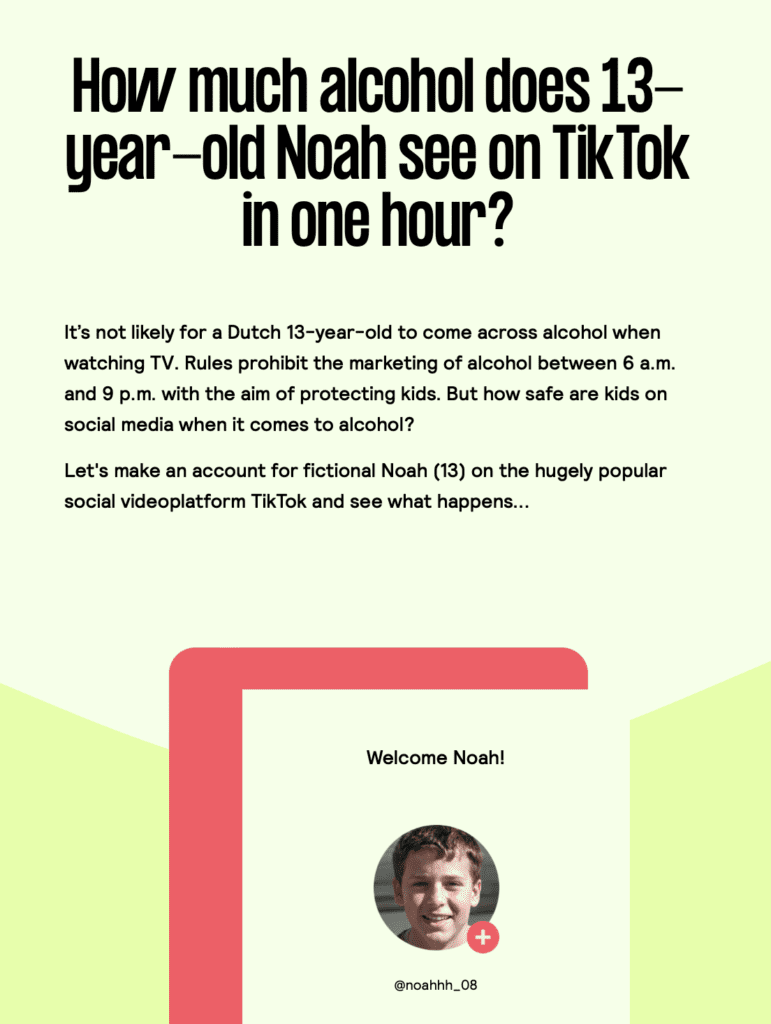According to the guidelines of social media platform Tiktok, it is not allowed to share content that promotes the possession or consumption of alcoholic beverages to minors. Nevertheless, minors get exposed to content that promotes alcohol use to a high degree on Tiktok.
A survey conducted by journalists at the research site Pointer found that the Tiktok feed a 13-year-old Dutch boy scrolled through for an hour was largely dominated by alcohol.
The reporters searched for, among other things, “drinking competition” and “mixed drinks”.
More than 200 videos appeared in which alcoholic beverages were visible. This means one in five videos.
The Pointer investigation exposes the predatory practices of the alcohol industry to use social media and push alcohol promotions on children.
According to Dutch law, it is forbidden to advertise alcohol on TV between 6pm and 9pm to protect children.
However, the law does not cover social media. And so, alcohol advertising, promotion, and sponsorship is rampant on social media platforms such as Tiktok, in the Netherlands – and other countries, like Sweden.
Apparent need for policy action to protect children from predatory alcohol industry practices
Irma Kilim, director of drug policy at IOGT-NTO in Sweden, says that online alcohol advertising should be banned in Sweden and refers to other European countries that have already taken action to better protect children and young people from the predatory practices of the alcohol industry.
Among others, countries like Norway, Estonia and Lithuania have banned alcohol advertising online, and this has had a clear effect,” says Ms. Kilim.
It is something that the WHO recommends and there is a government investigation that shows the need and the possibility of freeing social media from alcohol advertising. It is obvious that the existing legislation is not sufficient to protect young people on social media.”
Irma Kilim, director of drug policy, IOGT-NTO
Countries like the Netherlands and Sweden need to keep up
The legislation in the Netherlands and Sweden has not kept up with the digital development. Alcohol legislation is difficult to interpret and there are gray areas that would be eliminated with a complete ban of alcohol ads on social media. In that way, large platforms would have an easier time removing illegal advertising in an efficient manner.
In Sweden, people want such a protection of children from the predatory practices of the alcohol industry. According to a survey conducted by Novus this summer on behalf of IOGT-NTO, 55% of Swedes want to ban alcohol advertising in social media.
The majority of Swedes are in favor of a ban of alcohol advertising in social media, which shows that people think this is a problem and want to see change,” says Irma Kilim.
Irma Kilim, director of drug policy, IOGT-NTO
Alcohol advertising, including on social media, reinforces the alcohol norm and normalizes alcohol. Studies show that young people who are exposed to alcohol advertising both begin consuming alcohol earlier and consume more alcohol – both posing serious health and development risks to children and youth.
We know that it is common for the alcohol industry to use content creators and influencers. In some cases alcohol companies are behind videos showing alcohol advertising on social media.”
Irma Kilim, director of drug policy, IOGT-NTO
Sources
Pointer: “How much alcohol does 13-year-old Noah see on TikTok in one hour?“
Accent: “Alkoholreklam i var femte Tiktok-video“

